"Do the best you can until you know better. Then when you know better, do better.” - Maya Angelou
About
The Anti-Black Racism (ABR) Book Club plays a crucial role in educating and engaging individuals about issues of Anti-Black Racism. The Book Club creates a dedicated space for the community to learn about and engage with Anti-Black Racism. By coming together to read and discuss impactful literature, the book club helps foster a deeper understanding and commitment to combating racism on campus and in our communities.
Start a Book Club
The Leddy Library encourages you to start your own Anti-Black Racism Book Club. By forming your own group, you can extend the impact of these important discussions, fostering awareness and action in your own community. Join us in this journey of education and reflection and help create a more inclusive and just society.
If you are looking to start an Anti-Black Racism book club in your faculty or department the Leddy Library now has four sets of book club novels to help launch your own ABR book club:
- So you want to Talk about Race by Ijeoma Oluo
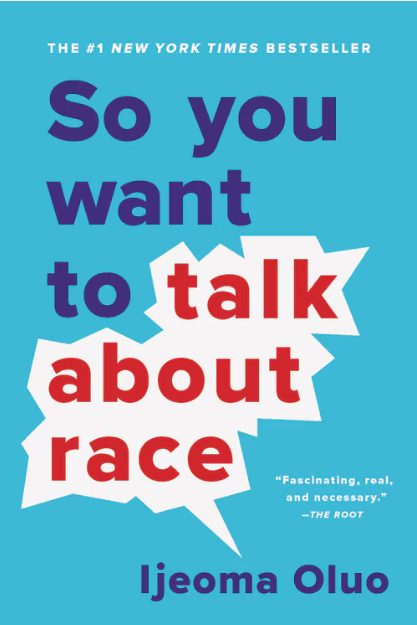
"A current, constructive, and actionable exploration of today's racial landscape, offering straightforward clarity that readers of all races need to contribute to the dismantling of the racial divide. In So You Want to Talk About Race, Editor at Large of The Establishment, Ijeoma Oluo offers a contemporary, accessible take on the racial landscape in America, addressing head-on such issues as privilege, police brutality, intersectionality, micro-aggressions, the Black Lives Matter movement, and the "N" word. Perfectly positioned to bridge the gap between people of color and white Americans struggling with race complexities, Oluo answers the questions readers don't dare ask, and explains the concepts that continue to elude everyday Americans. Oluo is an exceptional writer with a rare ability to be straightforward, funny, and effective in her coverage of sensitive, hyper-charged issues in America. Her messages are passionate but finely tuned, and crystalize ideas that would otherwise be vague by empowering them with aha-moment clarity. Her writing brings to mind voices like Ta-Nehisi Coates and Roxane Gay, and Jessica Valenti in Full Frontal Feminism, and a young Gloria Naylor, particularly in Naylor's seminal essay "The Meaning of a Word.""-- Provided by publisher.
Copies available: 15
Available at Leddy Library
Request to borrow the full set at the Information Desk.- The Skin We’re In by Desmond Cole
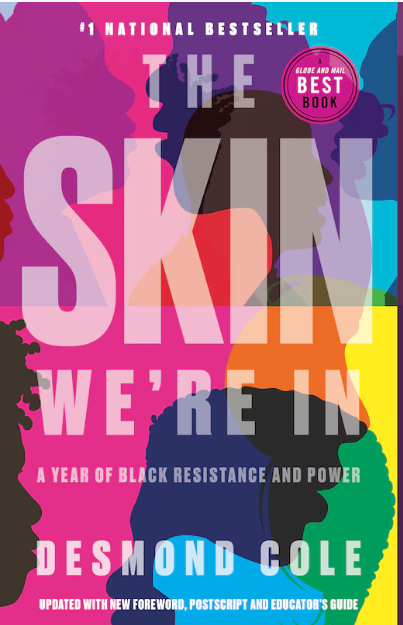
"In the tradition of Ta-Nehisi Coates, a bracing, provocative and perspective-shifting book from one of Canada's most celebrated and uncompromising writers, Desmond Cole. The Skin We're In will spark a national conversation, influence policy and inspire activists. In May 2015, the cover story of Toronto Life magazine shook Canada's largest city to its core. Desmond Cole's "The Skin I'm In" exposed the racist practices of the Toronto police force, detailing the dozens of times Cole had been stopped and interrogated under the controversial practice of carding. The story quickly came to national prominence, went on to win a number of National Magazine Awards and catapulted its author into the public sphere. Cole used his newfound profile to draw insistent, unyielding attention to the injustices faced by Black Canadians on a daily basis: the devastating effects of racist policing; the hopelessness produced by an education system that expects little of its black students and withholds from them the resources they need to succeed more fully; the heartbreak of those vulnerable before the child welfare system and those separated from their families by discriminatory immigration laws. Both Cole's activism and journalism find vibrant expression in his first book, The Skin We're In. Puncturing once and for all the bubble of Canadian smugness and naïve assumptions of a post-racial nation, Cole chronicles just one year--2017--in the struggle against racism in this country. It was a year that saw calls for tighter borders when African refugees braved frigid temperatures to cross into Manitoba from the States, racial epithets used by a school board trustee, a six-year-old girl handcuffed at school. The year also witnessed the profound personal and professional ramifications of Desmond Cole's unwavering determination to combat injustice. In April, Cole disrupted a Toronto police board meeting by calling for the destruction of all data collected through carding. Following the protest, Cole, a columnist with the Toronto Star, was summoned to a meeting with the paper's opinions editor and was informed that his activism violated company policy. Rather than limit his efforts defending Black lives, Cole chose to sever his relationship with the publication. Then in July, at another TPS meeting, Cole challenged the board publicly, addressing rumours of a police cover-up of the brutal beating of Dafonte Miller by an off-duty police officer and his brother. When Cole refused to leave the meeting until the question was publicly addressed, he was arrested. The image of Cole walking, handcuffed and flanked by officers, out of the meeting fortified the distrust between the city's Black community and its police force. In a month-by-month chronicle, Cole locates the deep cultural, historical and political roots of each event so that what emerges is a personal, painful and comprehensive picture of entrenched, systemic inequality. Urgent, controversial and unsparingly honest, The Skin We're In is destined to become a vital text for anti-racist and social justice movements in Canada, as well as a potent antidote to the all-too-present complacency of many white Canadians."-- Provided by publisher.
Copies available: 11
Available at Leddy Library.
Request to borrow the full set at the Information Desk.- They Said this would be Fun: race, campus life, and growing up by Eternity Martis
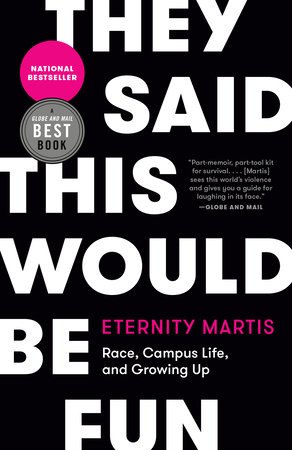
"From award-winning journalist Eternity Martis, a look at race and gender on campuses, and a personal tale of struggle and survival. Eternity Martis thought going away to university would help her discover who she really is--to escape her abusive boyfriend, her nerdy reputation, her coddled life with her doting Pakistani grandparents and rebellious mother, and her complicated feelings towards her absent Jamaican father. When she heads out to the predominantly white college town of London, Ontario, Eternity discovers an entitled culture of racism and sexism. As her boyfriend becomes increasingly violent, Eternity navigates her first parties, her father's continued attempts at a relationship, the revelation that she has several half-siblings she's never heard anything about, and the growing complexity of her friendships. What follows is a memoir of struggle about the difficulty of navigating through white spaces as a young woman of colour. And humour: a grown woman bouncing out the window of an inflatable castle after too much vodka, drugstore cashiers who announce a price check for your pregnancy test for the whole store to hear, extreme growing pains. But most of all, it's a story of perseverance and discovery. As more and more classmates of colour feel driven out of the university, Eternity decides to stay, and in doing so finds a group of likeminded women to support her through discovering who she is in a place that tries to tear her down. What we're left with is a portrait of the work students of colour must do to fight for themselves in spaces where they are supposed to be safe to learn and grow." -- Provided by publisher.
Copies available: 16
Available at Leddy Library.
Request to borrow the full set at the Information Desk.- How to be an Antiracist by Ibram X. Kendi
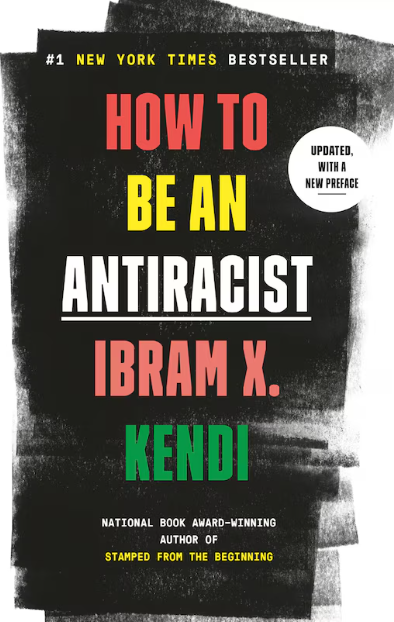
"The only way to undo racism is to consistently identify and describe it -- and then dismantle it." Ibram X. Kendi's concept of antiracism reenergizes and reshapes the conversation about racial justice in America -- but even more fundamentally, points us toward liberating new ways of thinking about ourselves and each other. In How to Be an Antiracist, Kendi asks us to think about what an antiracist society might look like, and how we can play an active role in building it. In this book, Kendi weaves an electrifying combination of ethics, history, law, and science, bringing it all together with an engaging personal narrative of his own awakening to antiracism. How to Be an Antiracist is an essential work for anyone who wants to go beyond an awareness of racism to the next step: contributing to the formation of a truly just and equitable society."-- Provided by publisher
Copies available: 17
Available at Leddy Library.
Request to borrow the full set at the Information Desk.
How to facilitate
The Anti-Black Racism Book Club should be a collaborative space where members are encouraged to help lead discussions. Reach out to members before meetings to offer them chance to step into roles as hosts or co-hosts:
- Host: Facilitates the discussion, asks questions, and ensures a smooth transition from one topic to the next.
- Co-host: Keeps the conversation focused and inclusive and can call for a pause when the group needs a moment to reflect.
Schedule meeting time
Set up a meeting schedule that works for your area and decide how many chapters will be read for each meeting. When Leddy Library implemented the book club, the meetings took place every two weeks and the group read 2-3 chapters before each session.
Provide your book club members ample time to reflect on the readings.
Send a Book Club Invitation
Email potential book club members to invite them to participate and share the book club welcome PDF and letter.
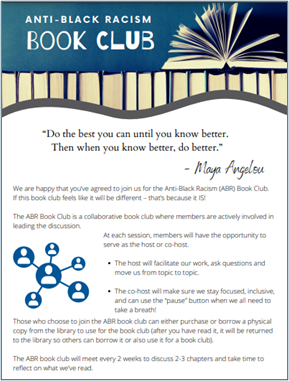
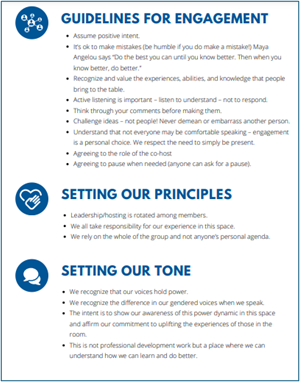
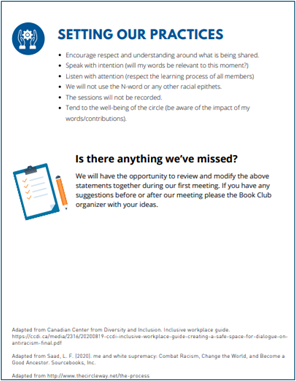
- Sample Welcome Letter
Good afternoon,
This is an invitation to join the Anti-Black Racism (ABR) Book Club. This is an opportunity to meet with colleagues to collectively read books that help to inform ourselves about anti-black racism (ABR) and ways we can engage with the issues of anti-black racism.
This book club is for people who are interested in engaging with this topic and participation is voluntary. Before the book club begins, we will share some guidelines to help us be intentional in creating a supportive environment where we can share reflections of what we have read.
At this Book Club we are coming as individuals who are looking to better understand the black experience but also understand how we relate to and respond to this experience. It is wonderful to hear the different points of view and perspectives of group members and to ask questions of each other in a non-judgmental space.
As colleagues we come together to discuss the different chapters- which makes it a wonderful way to learn about each other as well. Sometimes, members don’t have time to read the different chapters but that’s ok too – we understand that everyone is busy and that their voice and ear that comes is more important then “getting the homework done”!
Our group is informal on purpose – if you can come, that’s great, but if you can’t – that’s ok too. We really do respect the fact that members of the group are doing their best to learn and grow at their own pace.
We also give opportunities for people to grow in their facilitative skills – have you ever wanted to lead a group but have been a bit shy to do so? This is a perfect opportunity to try! It’s such a gift to use your voice and your ears with your colleagues in a supportive environment!
We will [schedule, time and location] and will be reading [book title].
If you’d like to join:
Indicate your participation to [Organizer Name and Email] Let the organizer know if you wish to borrow a book or if you plan to purchase your own or borrow from another community library.
Once we know how many people need a copy of the book, we will be acquiring the print copies for ABR Book Club members to borrow from the Leddy Library
If you have any questions about the book club, please let me know.
We are looking forward to hearing from you!
Encourage Discussion
By using the book club guidelines for engagement, express to your members how the book club meetings will go – read the guiding principles and have members agree to the terms. As a first discussion, you may want members to discuss the guideline for engagement and add other guidelines that may not be there. Depending on your context, there may be some guidelines that are more important than others. The idea is that the host must make it as harm free and non-judgemental as possible so that members want to share and engage.
ABR is a difficult topic, and members may have fears about “saying the wrong thing” - talk about this openly during that first meeting. Remember that this type of book club is not only about the book itself but how we learn to have difficult conversations based on respect and openness. Everyone will come into the space with different lived experiences. As the host, please lean into these lived experiences and encourage conversation around those experiences as they relate to the topic.
As the book club continues past the first meeting, you can encourage discussion by using your inquiry-based engagement questions:
- What surprised you?
- What challenged you?
- How did these readings resonate with your experiences?
- What questions do you have after reading this chapter?
At each session, we discuss a number of chapters. Depending on the size of your group, you may wish to break into smaller groups for breakout discussions.
You may wish to notify your members in advance about questions to discuss.
- Sample Reminder Letter
Good afternoon ABR book club members!
On [DATE], we will be discussing chapters [chapter #s or pages] for our next conversation.
We will focus on questions such as:- What surprised you?
- What challenged you?
- How did these readings resonate with your experiences?
- What questions do you have after reading these chapters?
However, these are not the only questions we can ask!
As the conversation takes us, we can use the time to highlight quotes or other part of the book that touched us.
Sample Session Timing and Agenda
- 10 minutes – Arrival, welcome, understanding of session
- 35 minutes – Discuss chapters in small groups of about 5 people each
- 15 minutes – Come back as a large group and open the floor to share insights


Connect with your library